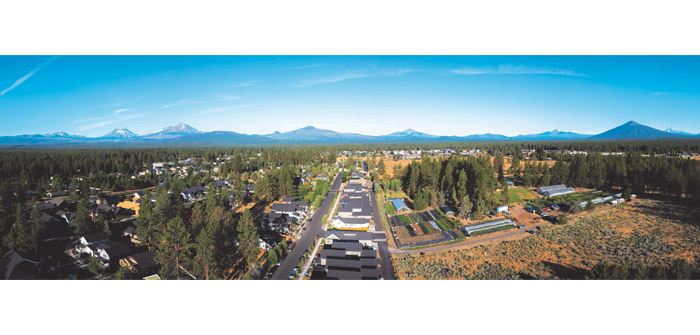(The Sisters area and its business scene are growing — including Seed to Table farm, pictured right | Photo courtesy of T. Lee Brown)
Business opportunities are on the rise in Sisters. With a thriving tourist trade built around a Western feel, the Sisters area is creating new opportunities for makers, artisans, and small agricultural efforts. The quaint yet bustling town is evolving and looking toward future expansion. Growing pains inevitably follow.
Justin Durham is president and co-owner of Sisters Coffee Company. Boasting 130 employees and three cafés — Portland, the Old Mill, and the Sisters flagship coffee-house — Sisters Coffee has evolved since Durham’s parents set up shop in a small house 35 years ago. Durham, his siblings, and his wife have shepherded the parents’ vision into a 21st century powerhouse.
The company built a new roasting facility in the Sun Ranch area two years ago; now wholesale and online sales provide 40% of its revenue, featuring a shift to recycled packaging. From Whole Foods to Safeway, about 350 grocery stores carry its wares.
In its retail and wholesale expansions and a recent rebrand, the company worked hard to balance its history with a strong vision for the future. “We have that conversation all the time,” says Durham. “What we’re trying to do is grow into a fuller version of who we already are, versus trying to chase something or try to be cool. How do we stay connected to our roots? And still get better and improve?”
“I think what’s going to be important for any organization, any city — it’s certainly true for Sisters Coffee — you have to grow deep as you grow out, like a tree,” says Durham. “If you don’t protect your roots, if you don’t grow downward as much as outward and upward, your tree is going to die.”
He recalls the doomed fate of an iconic local building. “Your tree’s going to fall over in a windstorm like the huge ponderosa that took out the Ski Inn. It must’ve been 500 years old.”
Contending with recent and projected changes, the Sisters community faces tension over housing, growth, the town’s brand, and Urban Growth Boundary (UGB) expansion. Local organizations, businesses, politicians, and residents have differing ideas about how Sisters should move forward.
“How can Sisters protect its root structure?” Durham wonders. “To me, that’s the rodeo, the quilt show, the folk fest. The things that make Sisters special.”
Small agriculture is one of those special attractions. An increasing array of fresh foods are grown and raised locally in a challenging physical environment. Innovative nonprofit Seed to Table farm passed its tenth anniversary of providing food access and education to the community, now yielding over 110,000 pounds of veggies annually. From upstart microgreens growers to stalwarts like Rainshadow Organics and Mahonia Gardens, farms and their points of distribution attract locals and tourists alike.
Amplifying the potential of small growers, makers, and artisans, the new Sisters Makers organization and the expanding Sisters Farmers Market are invigorating small business in town. EDCO’s Eric Strobel projects that within a few years, Sisters will have ample space them to grow.
“If these small businesses make the leap, there will be spaces as small as 900 square feet to accommodate them; zoning in some areas would also allow them to use 20% of it for retail,” he elaborates.
Sisters plays host to several traded-sector companies. Strobel is excited to see Metabolic Maintenance and Personalized Nutrients flourishing, retaining their current headquarters while opening new buildings down the road.
The light industrial zone is being developed out. “Those new buildings are going to need people — they’ll be hiring,” Strobel states. “Housing is our number one issue.”
Durham remembers when his family first moved to Sisters, staying in the town’s first apartment building. “That’s how we were able to live here,” he explains. “Having affordable apartments for employees, being strategic with density, it’s important.” In general, “I feel like we’re doing pretty good in Sisters; there’s forward-thinking minds here.”
Protecting the town’s roots and its special character can be balanced with growth and change. “For 25 years we didn’t have a high school in Sisters,” he reminisces. “I remember when we didn’t have a City sewer. Would we want to go back there?”
He considers his life and business in Sisters a blessing, one that fills him with a deep sense of gratitude and a profound sense of responsibility. Durham concludes, “My hope is that people will have conviction about honoring the past and continuing the legacy, an inheritance governing the vision for the future of Sisters.”
Disclosure: Sisters is a small town. The writer may have worked or volunteered with entities appearing in this series of articles.



